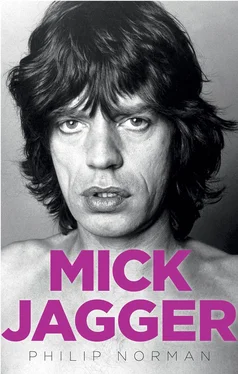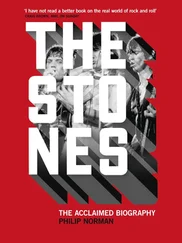By rights, the paper should have sought details from the loquacious and articulate Brian, but instead, because of the Korner connection, it contacted Mick. Consequently, he rather than Brian seemed like the leader of the band as he listed its personnel and showed a twinge of unease lest its new name should offend the Marquee’s purist blues audience. Brian, for some reason, had decided to revert to his slide-guitar alter ego for the occasion, so was not even identified: ‘Mick Jagger, R&B vocalist, is taking a rhythm and blues group into the Marquee tomorrow night while Blues Inc. is doing its Jazz Club gig. Called “The Rolling Stones” [“I hope they don’t think we’re a rock ’n’ roll outfit,” said Mick], the line-up is: Jagger (vocals), Keith Richards, Elmo Lewis (guitars), Dick Taylor (bass), “Stu” (piano) and Mick Avory (drums).’
So that night of 12 July 1962, under the pink-and-white canvas awning of the Marquee stage, Mick sang with the Rolling Stones for the very first time. To set off his cord trousers, he wore a horizontally striped matelot jersey, common enough among young men in the South of France but in London chiefly identified with girls or sexually ambiguous ‘chorus boys’ in West End musicals. As blues-singing attire, it was as daring as the white frilly dress he would select for an open-air show at the other end of Oxford Street seven years later.
The hour-long set consisted mostly of irreproachable blues and R&B standards by Jimmy Reed, Elmore James and Billy Boy Arnold, with the odd Chuck Berry like ‘Down the Road Apiece’ and ‘Back in the USA’ (‘New York, Los Angeles, oh, how I yearn for you . . .’). As Mick Avory did not, after all, play drums that night, the sound had considerably less attack than usual. Even so, many hard-core blues Marqueesards could not dissociate the word stones from rock; the applause was muted and at times almost drowned by whistles and boos.
Among the crowd that night was Charlie Watts, the drummer who occasionally played for Blues Incorporated but more regularly for Blues by Six, the band that was supposed to have given the Rolling Stones both a lead guitarist and a vocalist. Charlie was the epitome of the superior drummer class, immaculately dressed and barbered, with the almost tragically serious face of a latter-day Buster Keaton. True to form, he showed no outward emotion as the stripe-jerseyed figure onstage blew the ‘harp’ passages in Jimmy Reed’s ‘Bright Lights, Big City’ as if it were an erotic rite rather than a religious one. But, as he would recall, the highly esteemed blues and jazz musicians of his acquaintanceship all suddenly seemed like ‘eccentric old men’ compared with Mick.
Afterwards, collecting their £4 apiece (enough in these days to buy three LPs, dinner for two at an Angus Steakhouse or a pair of boots from the modish Regent Shoe store), Brian, Mick, Keith, Dick and Stu felt they had connected with the Marquee crowd at least enough to be offered further regular work there. But Harold Pendleton still considered them to be infected with rock ’n’ roll virus, if not in their repertoire then in the energy of their sound and the body language and flying hair of their front man. He would use them only as an interval band and with the worst possible grace, muttering that they were ‘bloody rockers’ and their R&B idols were ‘rubbish’.
Brian’s adverts in Jazz News and ceaseless touting for work brought a few gigs at other Soho clubs in transition from jazz to blues: the Piccadilly, Ken Colyer’s Studio 51 and the Flamingo in Wardour Street – the latter attracting a mainly black clientele, made up of West Indian immigrants and American servicemen. Here, it took real nerve for a white teenager to walk in and buy a drink, let alone get onstage and sing a Muddy Waters song, especially the way Mick did it.
Whereas Little Boy Blue and the Blue Boys used to shrink away from gigs, the Rolling Stones under Brian were positive gluttons for work. When Soho could not provide enough, they lit out for the suburbs once again, travelling in an old van that belonged to Ian Stewart – and trimming their name of its g to make the roll sound smoother. Following Ealing’s example, quiet Thames-side boroughs like Twickenham and Sutton also now had thriving blues clubs, in local church halls or bucolic pubs whose loudest sound had once been ducks on the river. In places where no club yet existed, the band would create their own ad hoc one, renting the hall or pub back room for a Saturday or Sunday night, putting up posters and handing out flyers: ‘Rhythm ’n’ blues with the Rollin’ Stones, four shillings [20p]’.
At this stage, Mick’s organisational talents were not much to the fore: Stu acted as driver and roadie and Brian was the self-appointed leader and manager (in which capacities he would secretly negotiate an extra payment from promoters or just take it when they were handling the money themselves).
While rehearsing at the Bricklayers Arms, they had taken an informal oath to keep their music pure and never ‘sell out’ to any commercial agent or record label should the possibility arise. But this resolution did not last long. Early in October, once again chivvied on by Brian, they went to Curly Clayton’s recording studios in Highbury, close to the Arsenal football ground, and recorded a three-track demo consisting of Jimmy Reed’s ‘Close Together’, Bo Diddley’s ‘You Can’t Judge a Book by Its Cover’ and (despite its fate-tempting potential) Muddy Waters’s ‘Soon Forgotten’.
The demo was sent first to the huge EMI organisation, owner of prestigious labels such as Columbia and HMV, which returned it without comment. Undaunted, Brian tried Britain’s other main label, Decca, and this time at least received some feedback with the rejection: ‘A great band,’ Decca’s letter said, ‘but you’ll never get anywhere with that singer.’
CHAPTER THREE THREE ‘Very Bright, Highly Motivated Layabouts’ FOUR ‘Self-Esteem? He Didn’t Have Any’ FIVE ‘“What a Cheeky Little Yob,” I Thought to Myself’ SIX ‘We Spent a Lot of Time Sitting in Bed, Doing Crosswords’ SEVEN ‘We Piss Anywhere, Man’ EIGHT Secrets of the Pop Stars’ Hideaway NINE Elusive Butterfly TEN ‘Mick Jagger and Fred Engels on Street Fighting’ PART II: THE TYRANNY OF COOL ELEVEN ‘The Baby’s Dead, My Lady Said’ TWELVE Some Day My Prince Will Come THIRTEEN The Balls of a Lion FOURTEEN ‘As Lethal as Last Week’s Lettuce’ FIFTEEN Friendship with Benefits SIXTEEN The Glamour Twins SEVENTEEN ‘Old Wild Men, Waiting for Miracles’ EIGHTEEN Sweet Smell of Success NINETEEN The Diary of a Nobody TWENTY Wandering Spirit TWENTY-ONE God Gave Me Everything Postscript Picture Section List of Searchable Terms Acknowledgements Also by Philip Norman Copyright About the Publisher
‘Very Bright, Highly Motivated Layabouts’ THREE ‘Very Bright, Highly Motivated Layabouts’ FOUR ‘Self-Esteem? He Didn’t Have Any’ FIVE ‘“What a Cheeky Little Yob,” I Thought to Myself’ SIX ‘We Spent a Lot of Time Sitting in Bed, Doing Crosswords’ SEVEN ‘We Piss Anywhere, Man’ EIGHT Secrets of the Pop Stars’ Hideaway NINE Elusive Butterfly TEN ‘Mick Jagger and Fred Engels on Street Fighting’ PART II: THE TYRANNY OF COOL ELEVEN ‘The Baby’s Dead, My Lady Said’ TWELVE Some Day My Prince Will Come THIRTEEN The Balls of a Lion FOURTEEN ‘As Lethal as Last Week’s Lettuce’ FIFTEEN Friendship with Benefits SIXTEEN The Glamour Twins SEVENTEEN ‘Old Wild Men, Waiting for Miracles’ EIGHTEEN Sweet Smell of Success NINETEEN The Diary of a Nobody TWENTY Wandering Spirit TWENTY-ONE God Gave Me Everything Postscript Picture Section List of Searchable Terms Acknowledgements Also by Philip Norman Copyright About the Publisher
Читать дальше












